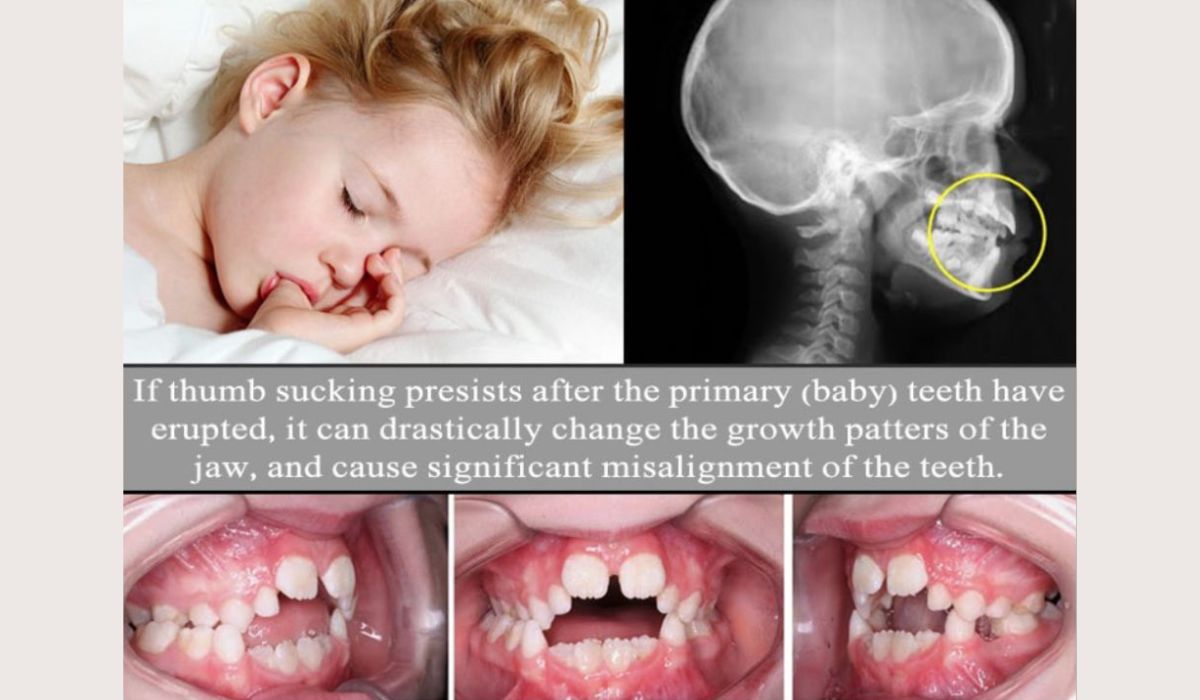The soothing action of sucking one’s thumb is a natural response in newborns and young children. Self-soothing behaviours like this typically start in the womb. However, when this behaviour is continued above a certain age, it can cause a number of dental and orthodontic problems.
The Development of Teeth
A child’s oral development hinges on the process of primary teeth eruption and the following growth of permanent teeth. Prolonged thumb sucking can interfere with this process, leading to improper jaw development and misaligned teeth.
Effects of Thumb Sucking on Teeth
Thumb sucking has been linked to misaligned teeth, which is a major cause for concern. A misaligned bite might be the result of constant pressure from the thumb, which can shift teeth out of place. It can also affect the development of the jaw, leading to a misaligned bite.
When Does Thumb Sucking Become a Concern?
Thumb sucking may seem harmless at first, but it should be addressed if it continues past the age of four or five. Dental concerns, language delays, and social difficulties are only some of the outcomes of persistent thumb sucking. The key to successful intervention is early detection of warning symptoms.
Preventing and Managing Thumb Sucking
When it comes to helping youngsters stop sucking their thumbs, parents and carers play a key role. Thumb guards, positive reinforcement, and other activities can all be used to help break the habit. There are times when it’s best to consult an expert.
The Role of Parents and Caregivers
Addressing thumb sucking requires establishing a nurturing and accepting atmosphere. The transition can go more smoothly if youngsters are encouraged to talk about their feelings and given support in developing healthy coping strategies.
Psychological Aspect of Thumb Sucking
Comfort can be found in the act of sucking one’s thumb. When kids are feeling uneasy or anxious, they could resort to this behaviour. Thumb sucking is a vicious cycle that can only be broken by addressing the underlying emotional causes.
Breaking the Habit: Practical Tips
Successfully putting an end to thumb sucking requires a gradual approach. A youngster may experience distress if the routine is abruptly ended. Parents can aid their children in taking ownership of quitting by explaining the repercussions and including them in the process.
Impact of Thumb Sucking on Speech
Speech delays have been linked to persistent thumb sucking. The location of the tongue and the ability to articulate well can be compromised by constantly having one’s thumb in one’s mouth. Speech therapy may help with these difficulties.
Long-Term Dental Complications
Thumb sucking has been shown to have consequences well beyond childhood. Long-term effects often include open bite, a condition in which the upper and lower front teeth do not come together during biting. A person’s appearance can also be affected by changes to their facial structure.
Dealing with Social Implications
Peer relationships become increasingly important as kids get older. Teasing and low self-esteem can result from habitual thumb sucking. Developing a healthy sense of self-worth and encouraging confidence are crucial.
Consulting a Dental Professional
Thumb sucking can be effectively managed with early intervention. Dentists can evaluate the severity of the problem and make specific recommendations for treatment. When teeth aren’t properly aligned, orthodontic care may be necessary.
Myths and Facts about Thumb Sucking
In order to help parents make educated decisions, it is important to clear up some common myths surrounding the practise of thumb sucking. Distinguishing fiction from reality can help calm nerves and direct steps in the right direction.
Promoting Dental Hygiene
Children who have a propensity of sucking their thumbs should see a dentist regularly. healthy dental health begins with learning and practising correct brushing techniques and maintaining a consistent routine of healthy oral hygiene.
Conclusion
In conclusion, although sucking one’s thumb is a common childhood practise, the negative consequences it might have on a child’s dental health and development should not be ignored. Helping youngsters break the practise of thumb sucking and avoid future dental issues requires adults to recognise the warning signals and act accordingly.
Frequently Ask Questions (FAQs)
At what age does thumb sucking typically become a concern?
If a child is still sucking their thumb at the age of four or five, it should be cause for concern.
Can thumb sucking lead to speech problems?
The position of the tongue can be impacted by habitual thumb sucking, which can in turn cause speech problems.
How can parents help children quit thumb sucking?
Positive reinforcement, alternative activities, and including the child in the process of quitting are all options for parents.
Is open bite a common consequence of thumb sucking?
Open bite, in which the upper and lower front teeth do not touch, is a common result of habitual thumb sucking.
When should I consult a dental professional about thumb sucking?
If your child is still sucking their thumb after the age of five, or if you see any dental misalignments, a visit to the dentist is in order.











